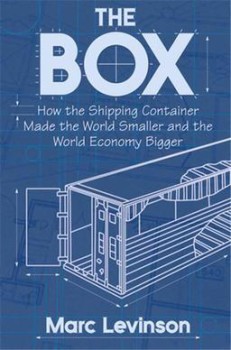The Ordinary World is a Myth: Marc Levinson’s The Box
 The Box: How the Shipping Container Made the World Smaller and the World Economy Bigger
The Box: How the Shipping Container Made the World Smaller and the World Economy Bigger
Marc Levinson
Princeton University Press (400 pages, $20.95, January 27, 2008)
Just finished reading The Box: How the Shipping Container Made the World Smaller and the World Economy Bigger by Marc Levinson.
Stifle that big **YAWN** for a minute. Especially as a science fiction writer, I love these histories of ordinary technologies, because they remind you that “ordinary” is itself a myth. Some revolutions come with explosions and special effects and some sneak up on you, but they both change the world.
As Levinson himself says in the book’s introduction, shipping containers are just big aluminum shoeboxes, less esthetically interesting than a can of beans, but their effects were just as revolutionary as the microchip and the Internet, and they were probably more important in building the globalized economy we live in today.
Before containers, loading a single ship with cargo was backbreaking, labor-intensive sweatwork that could take multiple gangs of longshoremen a week or longer. Costs were high, efficiency was low, wages and working conditions were terrible, and corruption and theft were endemic. However, at the same time, traditional ports supported a culture of their own, with whole neighbourhoods, factories, and a complete way-of-life centered around them.
Almost overnight, between 1963 and 1969, containerizaton turned all of that on its head. It obsoleted almost the whole worldwide fleet of merchant ships, and for good and ill, it erased the “On the Waterfront” culture of piers, stevedores, longshoremen and tramp steamers. Waterfronts with hundreds of years of history in places like New York, Boston, San Francisco, London and Liverpool simply died from one day to the next, while enormous new automated containership ports sprang into existence in places like Newark, Oakland and Rotterdam.
The cost of shipping goods around the world collapsed, enabling the rise of Japan, South Korea and China and the $250 supercomputer I’m typing this on. But containers also gave birth to the rustbelt, the death of local industry and the Walmartization of the economy.
So, yeah, in a nutshell, read this book!
Check out more details at the Princeton University Press website.
Mark Shainblum is an Ottawa-based science fiction, fantasy and comics writer. He is the author of Endogamy Blues, Playing Solitaire and Other Stories, and the co-editor (with Claude Lalumière) of the upcoming Superhero Universe: Tesseracts Nineteen. His website is www.shainblum.com.
Just in december i read “Big ships and ocean going” about the shipping industry (and containers) – really a fascinating subject you dont know anything about! (and the book is a great read too!).
There is a book series called “object lessons” from Bloomsbury. It always feautiured an every-day-object on roughly 150 pages. Worth checking out!
Containers rather spoil a load of Space Opera tropes – no interesting cargo hold, no need for gangs of workers… So much for Dumarest.